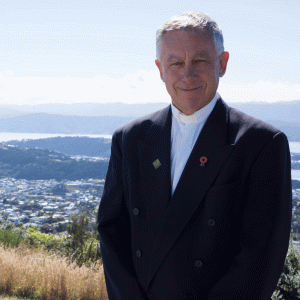April 2016
Reflection
Cardinal John Dew
Today, 3 April, the Second Sunday of Easter, is also Divine Mercy Sunday.
‘The pages of the Old Testament are steeped in mercy, because they narrate the works the Lord performed in favour of his people at the most trying moments in their history’, Pope Francis reminds us in his letter on the Year of Mercy, Misericordiae Vultus, [23]. In Jesus Christ, we see the face of the Father’s Mercy, in his ministry of healing and forgiveness, and especially in his Death and Resurrection. The Risen Lord continues to live in our midst. All throughout human history, even in its most tragic moments of sin and disaster, we can see God’s Mercy.
Confirming Biblical revelation, God has spoken a special message of Mercy, as we see in the life and teachings of St Margaret Mary Alacoque (1647–1690) and St Faustina Kowalska (1905–1938). This year, we have been gifted by Pope Francis with a Jubilee Year of Mercy. The message of God’s mercy is simple: God loves us, and never tires of forgiving us. God’s mercy is deeper than any human sin or tragedy.
Mercy is closely linked to compassion. During a Lenten homily on the Good Samaritan, Pope Francis, explained compassion can be summed up in three verbs: TO SEE, TO STOP, TO TOUCH. On 4 March, four Missionaries of Charity, along with 12 people they served, were killed in Yemen. These were women who had given their lives: to see, to stop and to touch some of the most vulnerable and neglected in society. Pope Francis has called them ‘martyrs of charity’. With Resurrection faith, we believe that through their sacrifice, they were transformed into signs of Christ’s victory over sin, violence and death. That same weekend, many parishes in the Archdiocese took part in the prayer ‘24 hours for the Lord’ – for these Sisters it was an entry into an eternity with the Lord.
We may not be called to such a dramatic way of living mercy, but there are ways we can engage in the corporal and spiritual works of mercy in this Year of Mercy. Where can we see, stop, touch those most in need of God’s mercy, in feeding the hungry, welcoming the stranger, forgiving those who have hurt us? Even in these small ways, God’s Easter gift of joy and peace will shine through.
Rejoice, for the Lord is truly risen, Alleluia.
